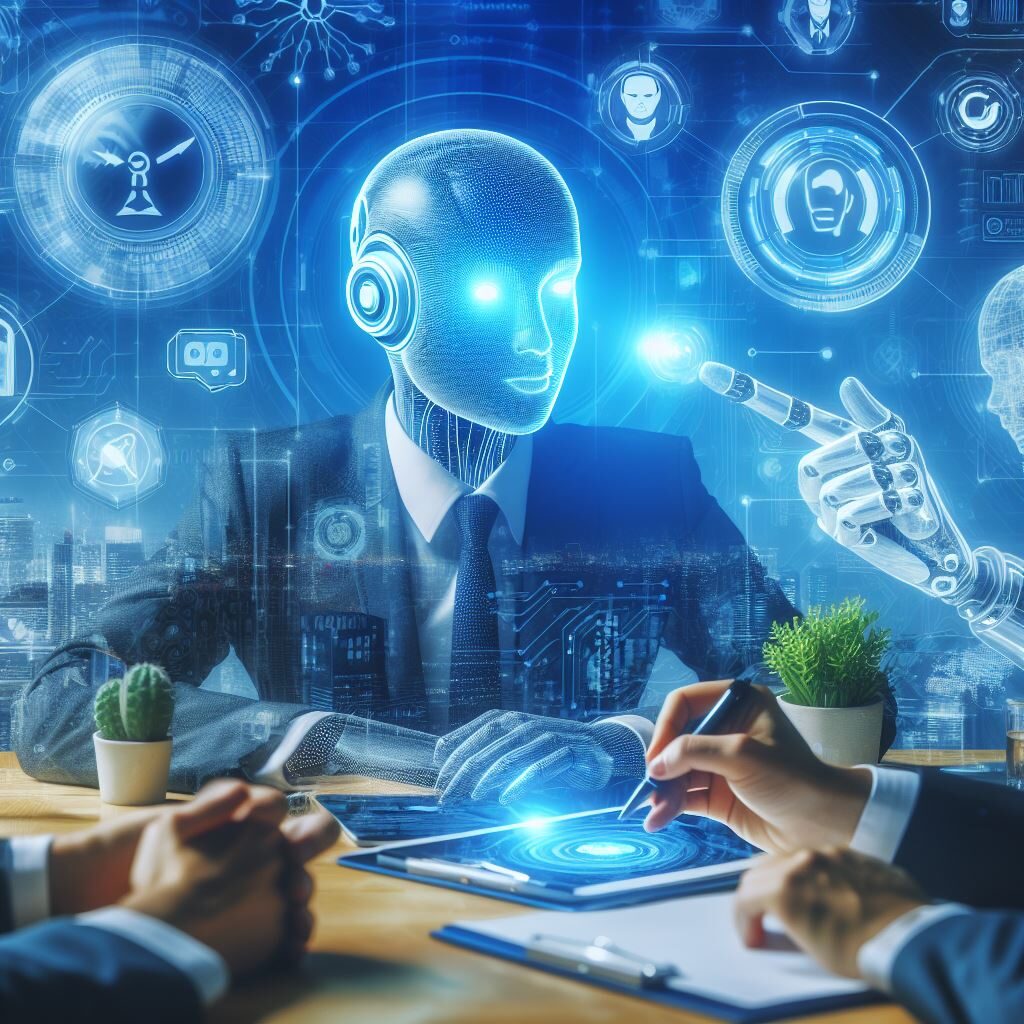Redefining Talent Acquisition: The Role of AI-Powered Recruitment in Modern Organizations
The dynamics of talent acquisition have undergone a remarkable transformation with the integration of Artificial Intelligence (AI) into recruitment strategies. The synergy between AI technology and human recruiters has ushered in a new era of efficiency, personalization, and enhanced decision-making in the recruitment landscape.
AI’s Evolution: Augmenting the Human Touch
AI in recruitment acts as a potent catalyst, aiming not to replace but to augment the capabilities of human recruiters. It streamlines the laborious, repetitive aspects of recruitment such as candidate sourcing, resume screening, and interview scheduling, enabling recruiters to focus on strategic initiatives and fostering genuine relationships with candidates.
AI algorithms powered by machine learning (ML) analyze vast datasets, identifying patterns, and providing actionable insights for recruiters. This proactive approach equips recruiters with invaluable data-driven guidance to make informed decisions in selecting the right talent.
Navigating Challenges in AI Integration: A Comprehensive Guide
While AI presents a transformative opportunity in recruitment, its integration is not devoid of challenges. Obtaining high-quality data to feed into AI systems remains fundamental. Organizations must harness a robust data infrastructure and ensure continuous data quality to enhance the accuracy and reliability of AI-driven decisions.
User resistance poses another challenge in AI implementation. Resistance may stem from the misconception that AI will replace human recruiters. Addressing this requires effective change management strategies, including comprehensive training, demonstrations of AI benefits, and highlighting the collaborative role of AI alongside human recruiters.
AI-Driven Diversity and Inclusion Initiatives

AI-driven recruitment tools play a pivotal role in fostering diverse, equitable, and inclusive hiring practices. By mitigating biases inherent in traditional recruitment methods, AI algorithms assist in identifying and nurturing diverse candidate pools.
Through AI-powered anonymized screening processes, recruiters can focus on candidates’ skills and qualifications rather than demographic factors. This approach contributes significantly to fostering a more inclusive workplace culture by ensuring equal opportunities for all applicants.
AI-Driven Tools and Strategies Redefining Recruitment Efficiency
An array of AI-driven recruitment tools has revolutionized various stages of the recruitment process. Chatbots equipped with natural language processing capabilities engage candidates effectively, offering personalized guidance, answering queries, and even scheduling interviews.
Intelligent search functionalities powered by AI streamline candidate search processes by providing accurate and relevant job results, enhancing the candidate experience. Automated interview scheduling tools eliminate the logistical back-and-forth, ensuring a seamless scheduling process for candidates and recruiters alike.
AI’s Role in Post-Pandemic Recruitment Strategies
The COVID-19 pandemic catalyzed the adoption of AI in recruitment. With remote work becoming the norm, organizations swiftly turned to AI-powered tools to navigate the challenges of remote hiring and onboarding.
AI-enabled recruitment platforms facilitated remote candidate engagement, assessment, and hiring processes, ensuring business continuity in the face of unprecedented disruptions. This adaptability empowered organizations to stay agile and competitive in attracting top talent in a rapidly evolving job market.
AI’s Transformative Impact on the Role of Recruiters
The evolution of AI in recruitment signals a paradigm shift in the recruiter’s role. Rather than replacing human recruiters, AI empowers them to evolve into strategic partners within organizations. Recruiters, equipped with AI-driven insights, can make swift and informed decisions, thus optimizing the hiring process.
The integration of AI frees recruiters from routine administrative tasks, allowing them to focus on relationship-building with candidates and hiring managers. This shift emphasizes the qualitative aspects of recruitment, enabling recruiters to delve deeper into assessing cultural fit and fostering meaningful connections.
Leveraging AI for Enhanced Personalization and Decision-Making
Personalization stands as a cornerstone of AI-powered recruitment. Through personalized job recommendations and dynamic content tailored to candidates’ profiles and search history, AI ensures a more engaging and targeted experience for potential talent.
Moreover, AI’s ability to deliver actionable data insights empowers recruiters to make data-driven decisions, enhancing the quality of hire and reducing time-to-fill metrics. These insights aid in identifying top-performing candidates and predicting their compatibility with organizational requirements.
Overcoming AI Implementation Challenges
To fully exploit AI’s capabilities in recruitment, organizations must establish comprehensive frameworks for data acquisition and management. This encompasses setting up robust systems that not only collect but also meticulously organize and maintain data. The critical aspects here revolve around ensuring the precision, relevance, and consistency of data, as these factors significantly influence the potency and efficiency of AI-driven recruitment processes.
Furthermore, achieving seamless integration and user acceptance of AI technologies necessitates an environment that actively encourages learning and adaptation. Initiatives such as comprehensive educational programs, specialized training modules, and consistent communication channels are indispensable. These avenues are pivotal in dispelling any apprehensions or resistance toward AI adoption, fostering a culture that embraces AI as a collaborative ally to human recruiters. Demonstrating the harmonious interplay between AI’s capabilities and the expertise of human recruiters is fundamental in nurturing a cohesive and productive work environment that maximizes the potential of both entities.
AI and Future Recruitment Trends: Embracing Innovation

As we navigate the future landscape of recruitment, the trajectory of AI’s role is anticipated to expand significantly. Projections indicate an evolution toward more sophisticated AI-driven tools, potentially encompassing predictive analytics, refined talent pipeline management systems, and even the emergence of AI-driven interview processes. These forthcoming trends are aimed at augmenting recruitment practices by incorporating higher precision and efficiency into the selection process.
The continued progression of AI technology unveils a myriad of opportunities for its integration within recruitment strategies. Envisioned applications span from predictive analytics that forecast candidate behaviors, streamlining decision-making, to the comprehensive integration of AI within talent management systems, optimizing every stage of the talent acquisition lifecycle. The realm of innovation and possibility within AI-driven recruitment techniques continues to broaden, promising unprecedented advancements in the quest for identifying, engaging, and retaining top-tier talent.
Conclusion: Navigating the AI-Driven Recruitment Landscape
The integration of AI in recruitment signifies a pivotal moment in the evolution of talent acquisition. The symbiotic relationship between AI technology and human recruiters presents an opportunity to revolutionize recruitment strategies and streamline processes while maintaining the essential human touch.
As organizations continue to navigate the competitive landscape for top talent, the effective utilization of AI in recruitment stands as a cornerstone for success. Embracing AI-driven innovations and leveraging its capabilities will undoubtedly shape the future of talent acquisition in an ever-evolving job market.
